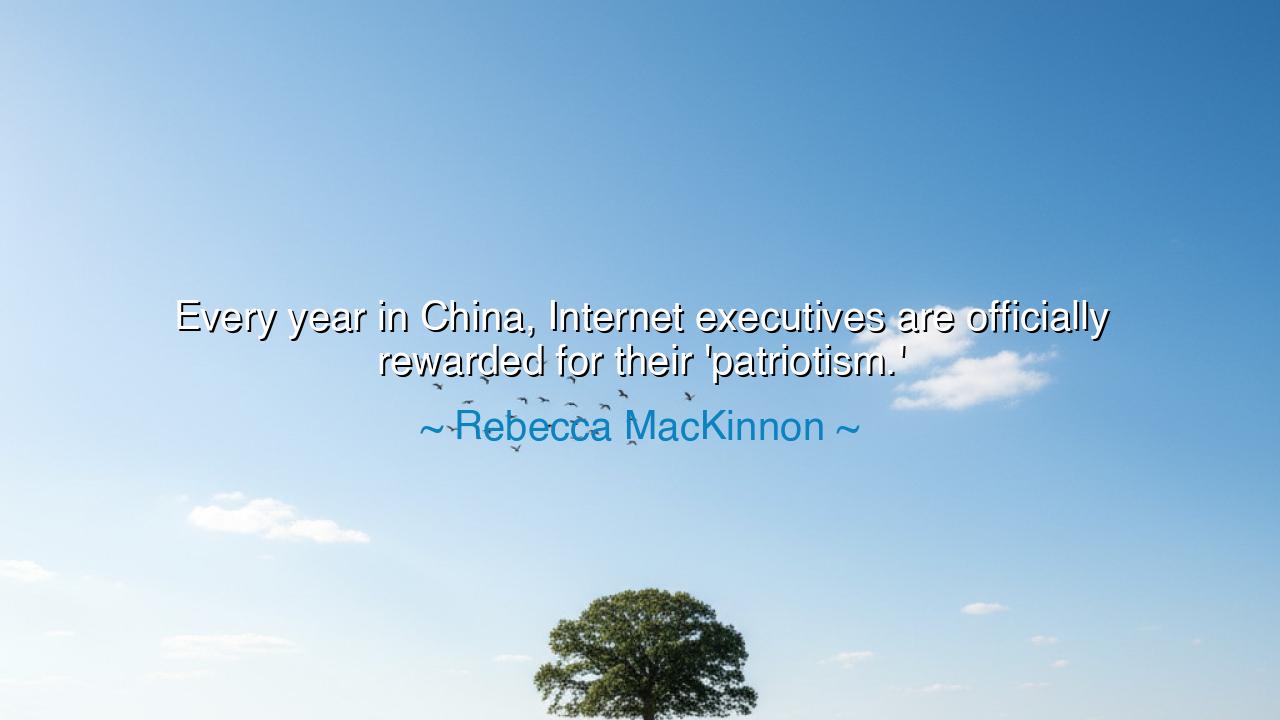
Every year in China, Internet executives are officially rewarded
Every year in China, Internet executives are officially rewarded for their 'patriotism.'






The words of Rebecca MacKinnon—“Every year in China, Internet executives are officially rewarded for their 'patriotism.'”—sound less like an observation and more like a parable for our age. In them we hear the reminder that power often seeks to define virtue on its own terms. In this case, patriotism is not simply love of one’s land or service to one’s people—it is measured, rewarded, and bestowed by authority, especially upon those who conform to the state’s vision. When even digital architects and entrepreneurs are judged not by their innovation or service to humanity, but by their loyalty to political power, we see the transformation of patriotism into a tool of control.
The ancients would have understood this deeply. For what are honors, if not symbols given by rulers to bind the hearts of the ambitious? In Rome, emperors bestowed crowns, titles, and triumphs not only upon warriors but upon poets and philosophers who exalted their reign. The gift was not only a reward, but a chain—a golden leash that kept the honored bound to the throne. So too does MacKinnon’s warning show us: when patriotism is defined and rewarded from above, it ceases to be the free devotion of the heart and becomes instead a currency of obedience.
The story of China’s Internet executives reflects this timeless struggle between power and freedom. The digital world, by nature, offers freedom of speech, connection across borders, and the exchange of ideas beyond state control. But in China, those who oversee these networks are judged by how well they align technology with government aims—by how faithfully they enforce censorship, limit dissent, and silence voices deemed dangerous. Their patriotism is rewarded not for serving the people, but for serving authority. In this way, the great gift of the Internet—its ability to connect and liberate—is bent into an instrument of surveillance and control.
History offers similar examples. Consider the intellectuals of Stalin’s Soviet Union, many of whom received medals and honors for their “patriotism.” Writers, scientists, and artists were celebrated not for the truth they spoke, but for their loyalty to the Party’s vision. Those who conformed were rewarded; those who resisted were silenced, imprisoned, or erased. Their talents, like those of the Internet executives today, were harnessed to uphold a system that demanded not free devotion, but obedience disguised as patriotism.
And yet, even in such times, there have always been those who resist. Aleksandr Solzhenitsyn, though persecuted for his writings, chose truth over honor, conscience over reward. His courage reminds us that real patriotism is not what rulers bestow, but what a soul offers in devotion to justice, dignity, and truth. To love one’s nation is not to serve its rulers blindly, but to serve its people faithfully, even when it costs dearly.
The lesson is profound: beware when patriotism is defined by those in power, for it may no longer be loyalty to the nation but loyalty to the throne. True patriotism cannot be bought with rewards or medals. It is found in acts of service that uplift the common good, in courage that speaks truth to power, in the protection of the weak and the defense of freedom. It is a fire in the heart, not a title conferred from above.
Practical action flows from this wisdom. In our own lives, let us question what “patriotism” means when used by the powerful. Do not mistake obedience for devotion, nor conformity for love of country. Support leaders and institutions only when they serve truth and justice. In your work, in your speech, and in your actions, let your loyalty be to the people and their well-being, not to empty displays of loyalty demanded by authority. For in this, you walk the path of genuine patriotism.
Thus, Rebecca MacKinnon’s words endure as a teaching for the digital age: when patriotism is reduced to a badge handed down by rulers, it ceases to be true. Let us therefore pass down to future generations this wisdom: love your country not by bowing to power, but by serving its people with honesty, courage, and care. For only then is patriotism real, and only then is it worthy of honor.






AAdministratorAdministrator
Welcome, honored guests. Please leave a comment, we will respond soon